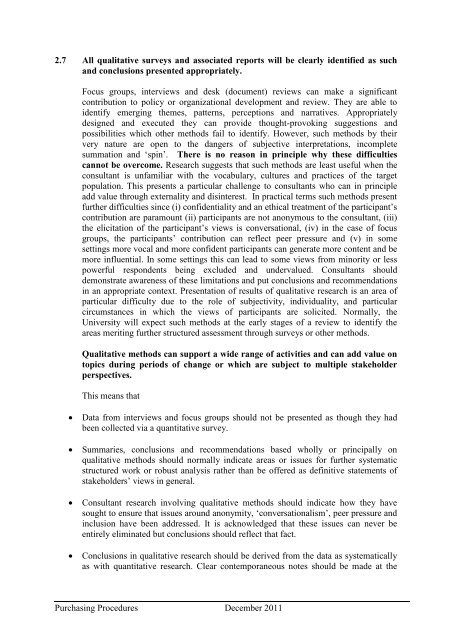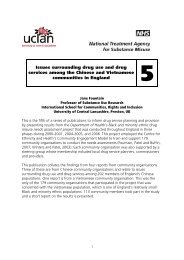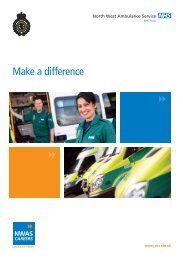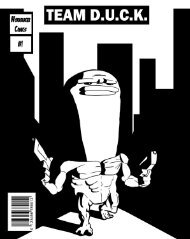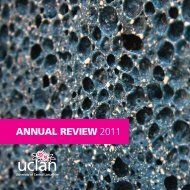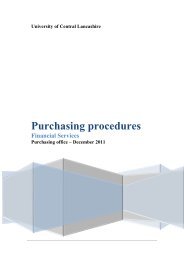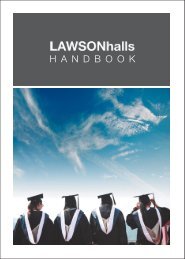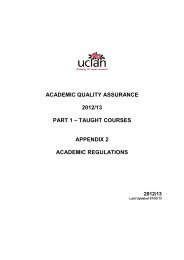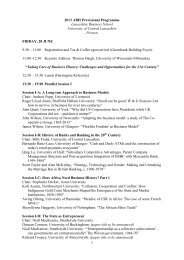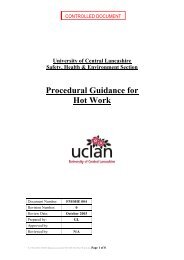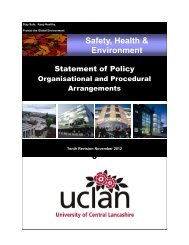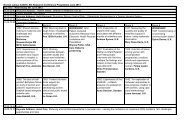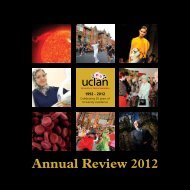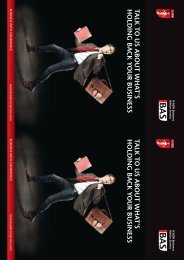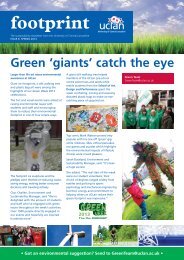PURCHASING PROCEDURES - University of Central Lancashire
PURCHASING PROCEDURES - University of Central Lancashire
PURCHASING PROCEDURES - University of Central Lancashire
Create successful ePaper yourself
Turn your PDF publications into a flip-book with our unique Google optimized e-Paper software.
2.7 All qualitative surveys and associated reports will be clearly identified as such<br />
and conclusions presented appropriately.<br />
Focus groups, interviews and desk (document) reviews can make a significant<br />
contribution to policy or organizational development and review. They are able to<br />
identify emerging themes, patterns, perceptions and narratives. Appropriately<br />
designed and executed they can provide thought-provoking suggestions and<br />
possibilities which other methods fail to identify. However, such methods by their<br />
very nature are open to the dangers <strong>of</strong> subjective interpretations, incomplete<br />
summation and „spin‟. There is no reason in principle why these difficulties<br />
cannot be overcome. Research suggests that such methods are least useful when the<br />
consultant is unfamiliar with the vocabulary, cultures and practices <strong>of</strong> the target<br />
population. This presents a particular challenge to consultants who can in principle<br />
add value through externality and disinterest. In practical terms such methods present<br />
further difficulties since (i) confidentiality and an ethical treatment <strong>of</strong> the participant‟s<br />
contribution are paramount (ii) participants are not anonymous to the consultant, (iii)<br />
the elicitation <strong>of</strong> the participant‟s views is conversational, (iv) in the case <strong>of</strong> focus<br />
groups, the participants‟ contribution can reflect peer pressure and (v) in some<br />
settings more vocal and more confident participants can generate more content and be<br />
more influential. In some settings this can lead to some views from minority or less<br />
powerful respondents being excluded and undervalued. Consultants should<br />
demonstrate awareness <strong>of</strong> these limitations and put conclusions and recommendations<br />
in an appropriate context. Presentation <strong>of</strong> results <strong>of</strong> qualitative research is an area <strong>of</strong><br />
particular difficulty due to the role <strong>of</strong> subjectivity, individuality, and particular<br />
circumstances in which the views <strong>of</strong> participants are solicited. Normally, the<br />
<strong>University</strong> will expect such methods at the early stages <strong>of</strong> a review to identify the<br />
areas meriting further structured assessment through surveys or other methods.<br />
Qualitative methods can support a wide range <strong>of</strong> activities and can add value on<br />
topics during periods <strong>of</strong> change or which are subject to multiple stakeholder<br />
perspectives.<br />
This means that<br />
<br />
<br />
<br />
<br />
Data from interviews and focus groups should not be presented as though they had<br />
been collected via a quantitative survey.<br />
Summaries, conclusions and recommendations based wholly or principally on<br />
qualitative methods should normally indicate areas or issues for further systematic<br />
structured work or robust analysis rather than be <strong>of</strong>fered as definitive statements <strong>of</strong><br />
stakeholders‟ views in general.<br />
Consultant research involving qualitative methods should indicate how they have<br />
sought to ensure that issues around anonymity, „conversationalism‟, peer pressure and<br />
inclusion have been addressed. It is acknowledged that these issues can never be<br />
entirely eliminated but conclusions should reflect that fact.<br />
Conclusions in qualitative research should be derived from the data as systematically<br />
as with quantitative research. Clear contemporaneous notes should be made at the<br />
Purchasing Procedures December 2011


